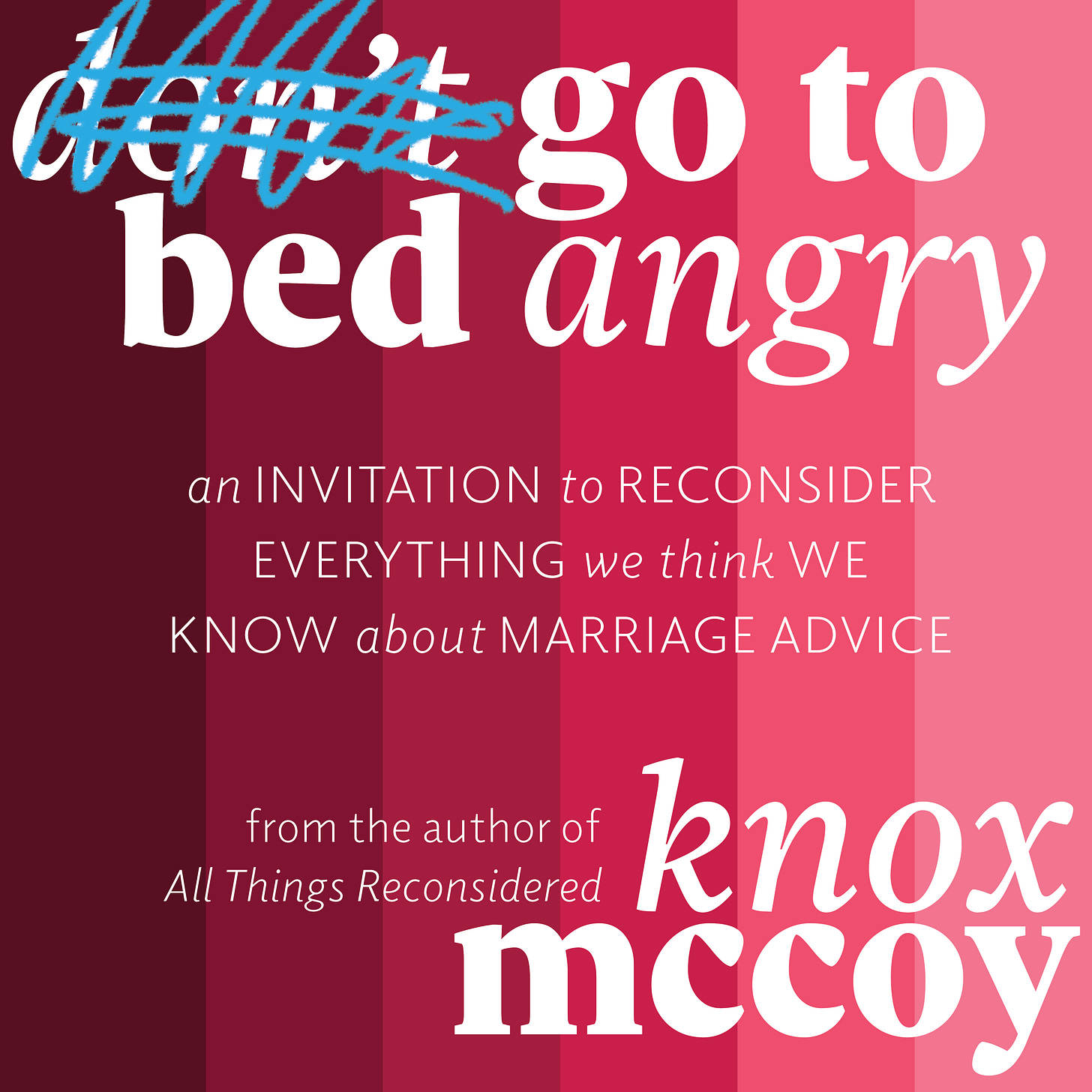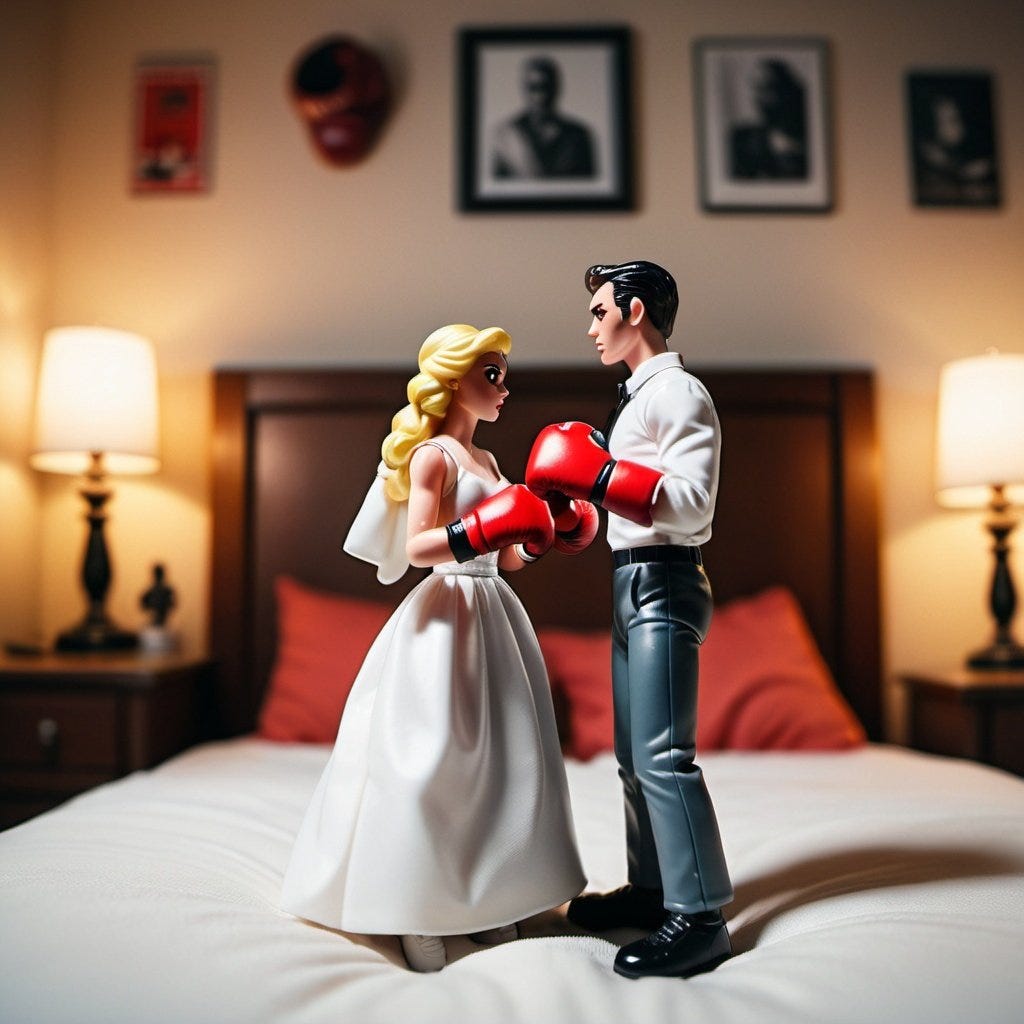Hi, hello. Greetings and salutations, etc etc.
Obviously, it’s a very exciting day and everything as Book #3, Go To Bed Angry, is OFFICIALLY available as an eBook/audiobook bundle.
WHAT IS INCLUDED?
So glad you asked: 14 chapters1, 90 pages, 3 hours of CUSTOMIZED audio, and 12 separate pieces of chapter art, all for the price of a large #1 at Chick-fil-A.2
If you want to sample the freebies before purchasing, though, you can read or listen to the introduction here. Additionally, Chapter 1 is included in this email with both the reading and listening options.
CAN I GET IT ON AUDIBLE / AMAZON / WHERE EVER BOOKS ARE SOLD?
Not yet. I’m keeping this in-house for now.
WHAT ABOUT AS A PHYSICAL COPY?
Again, not yet. But perhaps SOON.
ARE THERE DISCOUNT CODES AVAILABLE?
Great question!
The book itself is free for Founding Members3 of this newsletter.
DABS (dearly and beloved supporters) of the newsletter can scroll down to the bottom of this post where you’ll get a code for **40%** off.
If you are a Popcast BFOTS, head over to Patreon and you’ll see your discount code for 30% off there.
WHAT ABOUT IF I SUBSCRIBE TO YOUR NEWSLETTER AND THAT’S IT? SHOULDN’T I GET A DISCOUNT CODE TOO?
I mean, sure, why not? For everyone else, the audio and ebook bundle is $15, but if you are a subscriber here, use code “TCS20” to get 20% off.
And if times are tight and you just can’t pay the $12, holla at ya boi and we’ll figure something out.
More on the book, the motivation behind it, and the process of it coming to fruition later, but for now, without further adieu, please enjoy the first chapter of Go To Bed Angry.
Read or Listen to the Introduction for Go To Bed Angry
CHAPTER 1: “Don’t Go To Bed Angry.”
You hear a lot of unsolicited advice when you are young and married. Too much, honestly. Getting advice when you are newly married is like trying to transcribe the verbal wanderings of an auctioneer; you can try, but what's the point because it's all moving too fast?
And then, by the time you've been married for ten years, no one gives you advice anymore because they assume that if you've been married for ten years, you must be a Master and Commander of Matrimony, and no more notes are needed. I've always found this strange because, around ten years ago, things finally started to slow down, and I was ready to hear some insights.
Accordingly, I try to be someone who knows how much I don't know. I try to be a good listener and soak up lessons and advice where I can so that I can consider it for myself and see if it applies.
This is why, on multiple occasions, I've asked married family members, friends, and strangers on the internet about the piece of advice they've received most about marriage.
And much to my surprise, far and away, there was one singular and recurring recommendation that almost everyone cited receiving:
"Don't go to bed angry."
For something to have that kind of widespread acceptance, there must be substance to the heart of the message, right? We can only assume that going to bed angry is like a gateway experience wherein resentments, animosities, and probably polygamies will grow in place of the festering and unresolved rages if we make the foolhardy choice of falling prey to our circadian rhythms.
Just reading it, there's a kind of brevity about the advice that implies tremendous wisdom. Five words? WHAT ECONOMY OF SYNTAX.
And that's not even considering this advice has some connective tissue to the Bible. A piece of advice about marriage from the Bible? This makes it almost bulletproof!
Tracing it back, we can look to Ephesians 4:26, where Paul tells us, "Do not let the sun go down on the cause of your anger," to track one of the more formalized origins of this advice.
So what is there to reconsider about this particular advice? SO MANY THINGS, as it turns out.
First, if we prosecute this particular verse and the context around it, a couple of things stand out:
Christians give a verse like this a ton of influence because it comes from Paul, and Paul is a big deal, but we're still determining if Paul wrote Ephesians.
It's complicated because early versions of the letter don't specify Ephesus as the target of his message, and even more, the message is written more generally and impersonally, which is strange because Paul was pretty familiar with the people of Ephesus. It would be like writing a text message to a good friend but unironically phrasing it like, "Dear Sir/Madame. I hope this note finds you well. Please advise as to the synergy of our ideologies.
Sincerely, Knox."
I'm not really the person to delineate the scholarly conversation around this debate, but suffice it to say, this isn't even a new concern as there's been confusion about the authorship of Ephesians since the late 1700s, so it's unclear if Paul was just in his Chris Gaines era or if this is just another case of biblical pseudepigrapha like with Daniel or 2 Peter.
This probably non-Pauline advice about marriage is KIND OF, but that wasn't the original intent. The more prominent theme in Ephesians is mostly about emphasizing that Christians should get along with each other. If the book of Ephesians was remade into a movie, a song on that soundtrack would definitely be Why Can't We Be Friends?
Because remember, first-century Christianity was just new old Judaism with regular cultural clashes between Jews and Gentiles, so the emphasis on getting along and resolving disputes quickly was timely. But somewhere along the way, it became canonical advice for marriages, too.
To again reiterate the importance of context and of not misusing religion to validate something evil and wrong, Ephesians 6:5, "Slaves, obey your earthly masters with respect and fear, and with sincerity of heart, just as you would obey Christ," was a favorite verse of slave-holding Confederates during the Civil War as it both spoke to the conduct of enslaved people and implied a reality where slavery was valid and natural.
Obviously, we're more enlightened now and know that slavery is evil, but anyone living in the first century just understood slavery to be part of the deal, which, again, not to beat a dead horse, is why we can't always assume that just because something is cited as valid two thousand years ago, that it also has to be held as DEFINITIVELY true in today's time.
So, with all due respect to conventional wisdom, Paul, science, Ephesians, and everyone else burping out these pseudo-truths, the idea that you can't go to bed angry is, frankly, idiotic.
To me, it's one of those things that sounds profound because, again, it's brief, simple, and everyone keeps always saying it, but the second you find yourself in a four-hour emotional haymaker fest, and it's three hours until you both have to be up for work, you realize that this advice may not be as realistic as you once thought.
To be completely transparent, the moment I realized that Ashley and I were allowed to take our individual selves to bed, angry and mid-unresolved-argument transformed not just how I approached conflict but how I approached marriage and my assumptions of what should be versus what actually was.
It was the line of demarcation where I realized I had mistakenly allowed inherited and unscrutinized wisdom to inform who I was and how I was within my marriage.
And on a personal level, can I just say that some of the best sleep of my life has been when I'm angry.
It's all catharsis and freedom, and even more, it's good because it's an entire experiential buffet of opportunities, too.
You get to slam the bedroom door.
You get to angrily change your clothes.
You get to angrily slam the bathroom door.
You get to angrily flush the toilet.
You get to angrily apply your skincare routine.
You get to angrily floss, brush, and mouthwash.
I'm not trying to be melodramatic, but you haven't TRULY lived until you have flossed, brushed, and mouthwashed with anger and personal animus.
It's GLORIOUS, I tell you. The floss produces blood (thanks, gingivitis!), the brushing makes a FROTHY SPITTLE, the mouthwash a rancorous burning of the mouth, and you get to eject it all with extreme prejudice into the sink.
After that, you can FLING the covers out of your way so you can SLAM your head down on the pillow and then FLING the covers back over you before forgetting to put on your nightguard (thanks, teeth-grinding!), so you get to do all the cover flinging again as you angrily snap your nightguard into place.
And it's even better if your partner comes to bed after you because now you've marked that room and bed with your PALPABLE ANIMOSITY, and they must choose how to respond.
Do they meet your anger?
Exceed it?
Kowtow and capitulate?
From one perspective, doing all this may look like more conflict but just in another theater of war.
But from another perspective, it's letting the separation and space of sleep bring quiet to the hostilities so that it can be resumed with refreshed and different perspectives at a later time.
I'll willingly admit that maybe not going to bed angry is true for some couples. Perhaps it's a center of gravity for their love and sensibility, and maybe their beautiful and prurient souls can't truly rest until all discord and animosity have been sorted and filed away accordingly. If that's you and it works, I'm so happy for you. But that, resoundingly, has not been our experience.
I'll also acknowledge that other emotions aren't as fun to go to bed with. Fear, doubt, sadness, insecurity, and the feeling of being unknown or unsupported may require a different approach if experiencing them with your partner.
But for me, anger doesn't require special treatment. Instead, anger helps me hit that deep REM cycle, and even more, when I wake up the following day, the anger that I held so powerfully has been diluted by time, sleep, and the enduring love and affection I have for Ashley.
Sometimes, like fighters going to our separate corners, a halting of argumentative momentum is all we need to chill the heat of the fires fueling our discontent. Coming into our marriage, we didn't intuitively know this. Even well into our marriage, we didn't consciously choose to eschew this wisdom. Instead, we both mutually arrived at it after participating in multiple arguments that went on for hours, well past evening and into the early morning.
But even then, it wasn't something we talked about or discussed. It was more a subconscious understanding from both of us that our relationship was more than a vague truism about marriage and, even more, that what applies broadly to all marriages might not apply specifically to ours.
And once you realize that you and your partner are uniquely and exclusively empowered with designing the specificities of your relationship, you understand that resolving a fight isn't about doing it before bed; it's about granting each other the space and time necessary to resolve it healthily and productively.
That might be before you go to bed or after a deliciously vindictive night's sleep. Only you know which way works best, and only you should decide that.
Listen to this episode with a 7-day free trial
Subscribe to Binge Thinking to listen to this post and get 7 days of free access to the full post archives.











